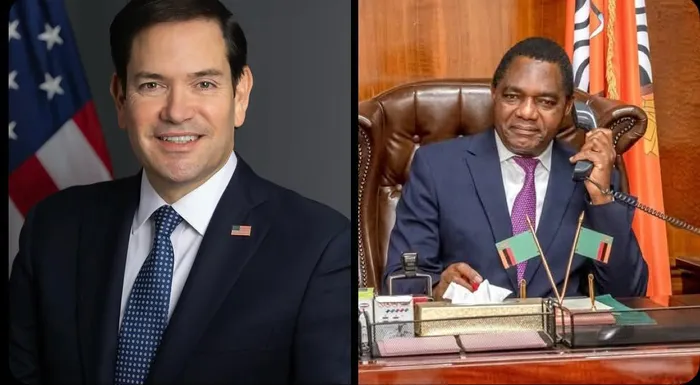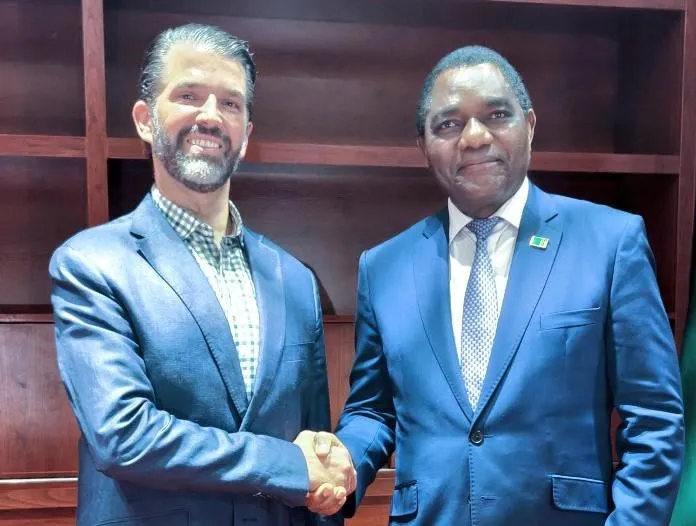
US Secretary of State Marco Rubio has held a telephonic conversation with President of Zambia Hakainde Hichilema on advancing cooperation between Zambia and the United States.
Image: Ministry of Finance Zambia/ X
Political analyst and international relations expert Dr Gideon Chitanga has warned that it would be short-sighted for the United States to believe it can pursue its African agenda while sidelining South Africa, as Washington appears to be making bold moves to advance its relations with Zambia.
Chitanga’s remarks come as the relationship between Pretoria and Washington has continued to deteriorate throughout 2025, while the US has moved to fortify its ties with the Republic of Zambia through a series of diplomatic, political, and development engagements that unfolded within days of one another.
While South Africa endures the wrath of Washington — recently underscored by the US decision to boycott the upcoming G20 Summit in Johannesburg and ongoing disagreements on geopolitical and security matters — Zambia is emerging as a rising partner in the southern Africa region.
Chitanga said Zambia’s growing importance to the United States is closely tied to Western strategic interests in the region.
“Zambia is strategically in the orbit of Western geo-strategic calculations if you consider the Lobito Corridor, a competing natural resource framework with the Belt and Road Initiative (BRI),” said Chitanga, a researcher at Maximilians-Universität München, based in Germany.
“The Lobito Corridor is an infrastructure project funded by the EU (European Union) and US to muscle their way into the mineral-rich belt bringing together Angola, Zambia, the DRC, and to try and get leeway into the web of related logistics in southern Africa.”

Gideon Chitanga, PhD, is an international relations and political analyst.
Image: Supplied
However, he cautioned that Washington would be making a strategic miscalculation if it attempted to build stronger ties with African countries, including Zambia, while excluding South Africa.
“I do not think that forging close ties with any of these countries while excluding South Africa makes economic and political sense,” he said.
Chitanga described South Africa as the continent’s most advanced and interconnected economy, saying it remains far better positioned to scale up its sectors than its regional peers.
“South Africa is the most integrated and sophisticated economy in sub-Saharan Africa, if not the whole continent, and one of the largest, if not the largest, economy in Africa,” he said.
“Despite its challenges, it is still by far better positioned to upscale in its various sectors than low-base economies like Zambia, the DRC, Angola, etc.”

Donald Trump Jr. pictured with President Hakainde Hichilema during an engagement in Zambia.
Image: Hakainde Hichilema/ X
Earlier this week, IOL reported that Donald Trump Jr, son of US President Donald Trump, held a warm, high-profile meeting with Zambian President Hakainde Hichilema during a private visit to the country.
The visit was followed by a high-level US government delegation’s arrival in Lusaka for talks on a multi-year health-assistance package, and later a phone call between Hichilema and US Secretary of State Marco Rubio.
The series of engagements has been interpreted as part of a broader American push to reinforce ties with Zambia — a move that contrasts sharply with Washington’s increasingly tense relations with Pretoria.
While Zambia’s growing alignment with the United States signals a shifting diplomatic landscape in southern Africa, Chitanga’s assessment suggests that South Africa’s economic and political weight remains central to any long-term Western strategy on the continent.
jonisayi.maromo@iol.co.za
IOL News
Related Topics: